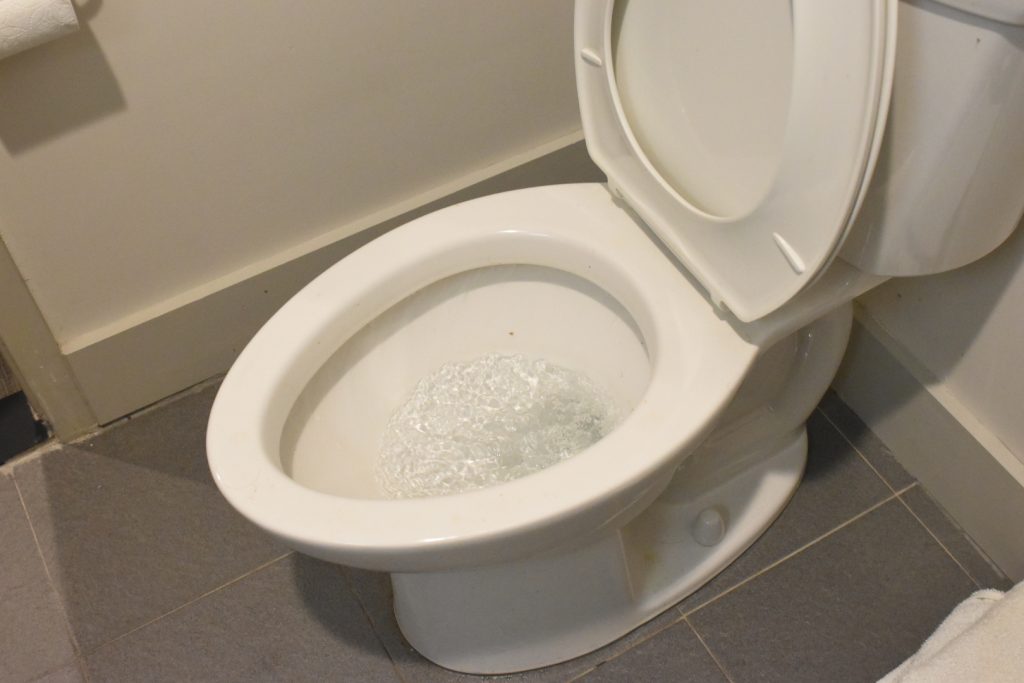A new kind of testing is happening at Binghamton University, and it’s not an exam.
BU has taken an approach to keeping the campus community safe through the use of wastewater testing, which can detect the presence of the coronavirus deposited by humans before developing symptoms. Wastewater or sanitary sewage is the combined flow of all liquid down the drain of sinks, showers, toilets, etc. from all campus buildings. The sanitary waste flows downhill through a system of interconnected pipes leading to the Binghamton-Johnson City Wastewater Treatment Plant (BJCWWTP).
Kelly Donovan, assistant director of environmental health and safety (EHS) at BU, has been water monitoring and reporting for several years. Donovan said that the wastewater testing is currently taking place as a supplement to surveillance testing to act as an early warning system.
“For at least 20 years, I have coordinated the testing/reporting of quarterly sampling of the sanitary waste system (oil/grease, lead, iron, mercury copper, etc.) as a requirement of our permit with the [BJCWWTP],” Donovan wrote in an email. “This spring and summer, as EHS was monitoring the [COVID-19] situation, we became aware of testing that was possible utilizing the sanitary waste. At about the same time, the lab that does our regular sampling contacted us to say they were able to perform [COVID-19] testing.”
Donovan explained that the testing process involves a selection of locations on campus, where automatic sampling devices placed by manholes draw a metered volume of water into a collection tank every 15 minutes for the duration of the test. By drawing multiple small samples, a composite sample can be obtained to be sent off for lab analysis at Microbac Laboratories in Cortland, NY, where the testing takes about three days. Although the sample may contain traces of COVID-19, the material in the waste stream is detectable, but not infectious. The lab process looks for COVID-19 ribonucleic acid (RNA) and later isolates and quantifies it to produce results.
According to JoAnn Navarro, vice president for operations, wastewater testing began on campus in August before students returned and continues to occur on a weekly basis.
“None of the test results have shown any detectable virus, with the exception of the waste stream associated with the on-campus residence halls where students who tested positive during move-in were isolated,” Navarro wrote. “To date, five rounds of tests have been performed and the first was a baseline before students returned to campus.”
Donovan stated that the testing has been adjusted to ensure a smooth process, especially in the upcoming months.
“At the time of that sample, there were approximately 10 students isolating in Old Digman [Hall] /[Old] Rafuse [Hall],” Donovan said. “We have modified collection locations since then and targeted occupied communities.”
A BingU News article from Sept. 22 outlined the process, but students like Albert Zhang, a sophomore majoring in psychology, claimed he had no prior knowledge of the testing and noted that students should have been notified before coming to campus.
“I am assuming that they take samples of the water and run it through some tests, but I have no clue about the procedures and process of the tests,” Zhang said. “They should stop it until they make a formal announcement about it. Coming from someone who is generally comfortable with everything, it is a little off-putting and I can only imagine how much weirder it is for everyone or anyone else.”
Currently, the testing is taking place in 13 separate manholes that cover all residential communities. Hinman College, College-in-the-Woods, Mountainview College, Susquehanna and Hillside communities each have one combined sample location for the community while individual dorms in the Dickinson Community and Newing College are sampled individually due to size.
According to Donovan, Residential Life has been notified of this testing, but many students were not aware of the process and what it entails.
Zhang lives in Mountainview College and revealed anxiety about the lack of communication with students concerning wastewater testing.
“When I heard about it, I did not initially know what it was and it made me slightly uncomfortable because, in my head, I felt that the school should be communicating with the students about something this important,” Zhang said. “I’m kind of shocked and a little betrayed. There is a level of privacy that I feel has been bypassed. If it was more widely spoken about, I wouldn’t feel the same.”
Chris Pillay, a junior majoring in chemistry, lives in Hillside Community and expressed his concern over the finances of wastewater testing.
“I think that it’s somewhat a waste of time,” Pillay said. “At first, I thought it was gross and creepy, but I think if it’s used in tandem with selective testing then it could be effective. As long as it’s not using up too much money and it’s giving results then it’s okay.”
Donovan noted that if there is a rise in detectable levels in specific samples, additional sampling can be scheduled and may prompt a retest of that sample. All results are tabulated weekly in a Google Document that is shared with the University administration and the Public Health Advisory group.
“[BU] President [Harvey] Stenger and University administration has committed to testing for the foreseeable future,” Donovan wrote. “As with many other things these days, things change and we need to be ready to adapt to conditions and adjust as necessary to protect our students, staff and faculty to the best of our ability.”



